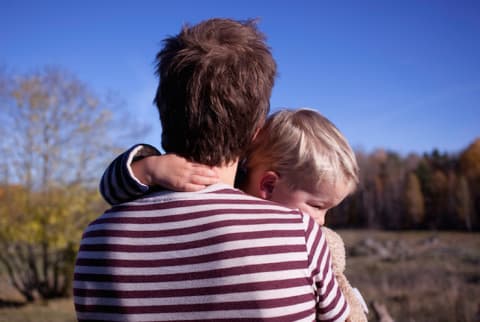Advertisement

When tragedy strikes, parents often find themselves doubly challenged. Not only are they processing their own feelings of grief and distress, but they’re also struggling to help their children do the same.
With the recent attacks in Paris, families all over the world are grappling with how to explain the tragic events to young people, from toddlers to teenagers. And we’re thirsty for guidance and affirmation; this week, a video of a Parisian father comforting his son went viral.
I wish I could tell you how to shield your children from pain and fear when tragedy strikes, especially when it’s close to home.
But I can't do that. That’s not the world we live in.
As a child and adolescent psychiatrist and the president of the Child Mind Institute, what I can do is share what I've learned about how to help children process disturbing events in the healthiest way possible.
You can't protect kids from grief, but you can help them express their feelings, comfort them, and help them feel safer.
Here’s what I recommend:
1. Break the news as soon as possible.
When something happens that will get wide coverage, such as the attacks in Paris, my first and most important suggestion is that you don't delay telling your children about what's happened. It's much better for the child if you're the one who tells her.
You don't want her to hear from some other child, a television news report, or the headlines on the front page of the New York Post. You want to be able to convey the facts — however painful — and set the emotional tone.
2. Take your cues from your child.
Invite her to tell you anything she may have heard about the tragedy, and how she feels. Give her ample opportunity to ask questions.
You want to be prepared to answer (but not prompt) questions about upsetting details. Your goal is to avoid encouraging frightening fantasies.
3. Model a sense of calm.
It's okay to let your child know if you're sad, but if you talk to your child about a traumatic experience in a highly emotional way, then he will likely absorb your emotion and very little else.
If, on the other hand, you remain calm, he is likely to grasp what's important: that tragic events can upset our lives, even deeply, but we can learn from bad experiences and work together to grow stronger.
4. Reassure them of their safety.
Talking about death is always difficult. But a tragic accident or act of violence is especially tough because of how egocentric children are: they're likely to focus on whether something like this could happen to them.
So it's important to reassure your child about how unusual this kind of event is, and the safety measures that have been taken to prevent this kind of thing from happening to them.
You can also assure him that this kind of tragedy is investigated carefully, to identify causes and help prevent it from happening again. It's confidence-building for kids to know that we learn from negative experiences and help one another in difficult times.
5. Be developmentally appropriate.
Don't volunteer too much information, as this may be overwhelming.
Instead, try to answer your child's questions. Do your best to answer honestly and clearly.
It's okay if you can't answer everything — difficult conversations like these aren't over in one session. Expect to return to the topic as many times as your child needs.
5. Help them find outlets to express their feelings.
In your conversations, you can suggest ways your child might memorialize those that were lost, whether that’s drawing pictures, planting a tree, or lighting candles.
Doing something to help others in need can also be very therapeutic. It can help children not only feel good about themselves but learn a very healthy way to respond to grief.
And if you're religious, going to church or synagogue could be valuable.
6. Above all, be available.
If your child is upset, simply spending time with him may make him feel safer.
Children find great comfort in routines, and doing ordinary things together as a family may be the most effective form of healing.
For more information on how to help your child, please see the Child Mind Institute’s guide, Helping Children Cope After a Traumatic Event.
Related reads:
- 5 Mental Health Experts On How To Process Unfathomable Tragedy
- How To Handle The Hardest Conversation You'll Have With Your Kids: A Psychologist Explains
Watch Next
Enjoy some of our favorite clips from classes
Enjoy some of our favorite clips from classes
What Is Meditation?
Mindfulness/Spirituality | Light Watkins
Box Breathing
Mindfulness/Spirituality | Gwen Dittmar
What Breathwork Can Address
Mindfulness/Spirituality | Gwen Dittmar
The 8 Limbs of Yoga - What is Asana?
Yoga | Caley Alyssa
Two Standing Postures to Open Up Tight Hips
Yoga | Caley Alyssa
How Plants Can Optimize Athletic Performance
Nutrition | Rich Roll
What to Eat Before a Workout
Nutrition | Rich Roll
How Ayurveda Helps Us Navigate Modern Life
Nutrition | Sahara Rose
Messages About Love & Relationships
Love & Relationships | Esther Perel
Love Languages
Love & Relationships | Esther Perel
What Is Meditation?
Box Breathing
What Breathwork Can Address
The 8 Limbs of Yoga - What is Asana?
Two Standing Postures to Open Up Tight Hips
How Plants Can Optimize Athletic Performance
What to Eat Before a Workout
How Ayurveda Helps Us Navigate Modern Life
Messages About Love & Relationships
Love Languages
Advertisement

Why Women Are Twice As Likely To Struggle With Depression & Anxiety
Phyllis E. Greenberger, MSW

Why Women Are Twice As Likely To Struggle With Depression & Anxiety
Phyllis E. Greenberger, MSW










